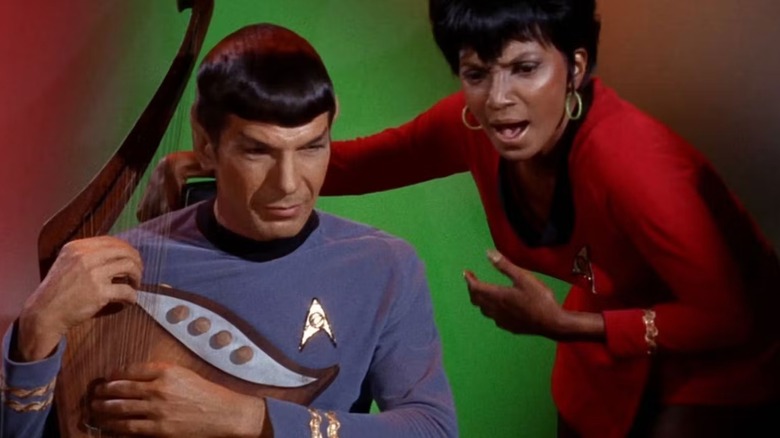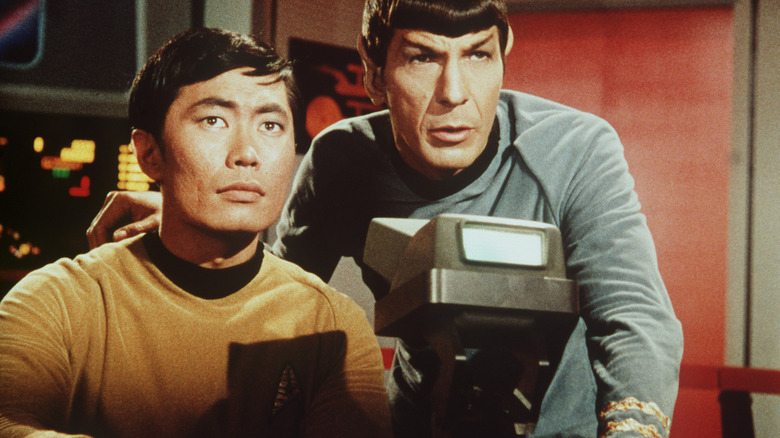Star Trek's Leonard Nimoy Fought To Get Nichelle Nichols & George Takei Paid
Some Trekkies might be able to tell you that filming "Star Trek: The Original Series" wasn't always a pleasant experience for the cast. Indeed, stars William Shatner and Leonard Nimoy were both notorious spotlight hogs and Shatner was known to reassign other actors' dialogue to himself, usually badgering directors until they agreed. Nimoy, meanwhile, knew that his character, Spock, was the most recognizable element of the show, and was happy to promote himself as the star of the series. The clash of egos reportedly got so bad that show creator Gene Roddenberry had to write an angry letter to the two lead actors (also DeForest Kelley) admonishing them for their bratty behavior. "You've pretty well divided up the market on selfishness and egocentricity," Roddenberry wrote.
Trekkies will hasten to point out that, while Shatner, Nimoy, and Kelley were the only three cast members listed in the show's opening credits, "Star Trek" functions best when seen as an ensemble drama. The same members of the bridge crew would appear every week, and many felt it was heartening to see characters like Lieutenant Uhura (Nichelle Nichols), Lieutenant Sulu (George Takei), and Ensign Chekov (Walter Koenig) joining in on the adventures every week. Shatner, Nimoy, and Kelley, one might expect, were paid more than their co-stars — a fact that, over time, made Nimoy a little upset.
The website TrekMovie once reached out to Nimoy to discuss the pay disparities and how the actor eventually became a champion for his co-stars. After "Star Trek" ended its run in 1969, Nimoy became a lot more sympathetic to how Nichols, Takei, and Koenig weren't getting enough money, and he frequently stood up against the franchise's penny-pinching overseers, hoping to help them. Because of this, Nimoy soon found himself the moral center of the cast.
Star Trek's Desilu years
It's worth remembering that "Star Trek" didn't become hugely popular until after it had to be canceled and put into syndication. Only through reruns did it find its audience. The reruns became popular enough to earn a lot of royalties for the actors while also inspiring a series of "Star Trek" conventions, which have been held on the regular since the early 1970s. Eventually, in 1973, an animated "Star Trek" TV spinoff was put into production. By then, Nimoy was a lot more sensitive to the pay structure and fame dynamic when it came to the cast. He also knew that he had to fight to ensure Nichols, Koenig, and Takei were included in the ensemble. Back in what he called "the Desilu years," Nimoy said he pushed back a lot. In his own words:
"There was also the case where George and Nichelle [were] not hired to do their voices in the animated series. I refused to do Spock until they were hired. Mr. Roddenberry started calling me the conscience of 'Star Trek.'"
While Nichols and Takei ultimately reprised their roles for "Star Trek: The Animated Series," Koenig was sadly cut out of that deal and Chekov didn't appear on the show. Koenig, however, recalled in a 2014 interview with the Las Vegas Sun that Nimoy had his co-stars backs from the very start (particularly Nichols):
"When it came to the attention of the cast that there was a disparity in pay in that George and I were getting the same pay, but Nichelle was not getting as much, I took it to Leonard and he took it to the front office and they corrected that."
Despite his anger-inspiring ego, Nimoy proved himself to be a stand-up fellow. Or, as Koenig put it, he was "a very good man. Sound ethics and a good sense of morality."

